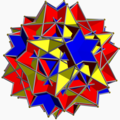Top Qs
Timeline
Chat
Perspective
Nonconvex great rhombicosidodecahedron
Polyhedron with 62 faces From Wikipedia, the free encyclopedia
Remove ads
In geometry, the nonconvex great rhombicosidodecahedron is a nonconvex uniform polyhedron, indexed as U67. It has 62 faces (20 triangles, 30 squares and 12 pentagrams), 120 edges, and 60 vertices.[1] It is also called the quasirhombicosidodecahedron. It is given a Schläfli symbol rr{5⁄3,3}. Its vertex figure is a crossed quadrilateral.
This article includes a list of references, related reading, or external links, but its sources remain unclear because it lacks inline citations. (August 2025) |
| Nonconvex great rhombicosidodecahedron | |
|---|---|
 | |
| Type | Uniform star polyhedron |
| Elements | F = 62, E = 120 V = 60 (χ = 2) |
| Faces by sides | 20{3}+30{4}+12{5/2} |
| Coxeter diagram | |
| Wythoff symbol | 5/3 3 | 2 5/2 3/2 | 2 |
| Symmetry group | Ih, [5,3], *532 |
| Index references | U67, C84, W105 |
| Dual polyhedron | Great deltoidal hexecontahedron |
| Vertex figure |  3.4.5/3.4 |
| Bowers acronym | Qrid |

This model shares the name with the convex great rhombicosidodecahedron, also known as the truncated icosidodecahedron.
Remove ads
Cartesian coordinates
Cartesian coordinates for the vertices of a nonconvex great rhombicosidodecahedron are all the even permutations of
where is the golden ratio.
Remove ads
Related polyhedra
Summarize
Perspective
It shares its vertex arrangement with the truncated great dodecahedron, and with the uniform compounds of 6 or 12 pentagonal prisms. It additionally shares its edge arrangement with the great dodecicosidodecahedron (having the triangular and pentagrammic faces in common), and the great rhombidodecahedron (having the square faces in common).
 Nonconvex great rhombicosidodecahedron |
 Great dodecicosidodecahedron |
 Great rhombidodecahedron |
 Truncated great dodecahedron |
 Compound of six pentagonal prisms |
 Compound of twelve pentagonal prisms |
Great deltoidal hexecontahedron

The great deltoidal hexecontahedron is a nonconvex isohedral polyhedron. It is the dual of the nonconvex great rhombicosidodecahedron. It is visually identical to the great rhombidodecacron. It has 60 intersecting cross quadrilateral faces, 120 edges, and 62 vertices.
It is also called a great strombic hexecontahedron.
Remove ads
See also
References
External links
Wikiwand - on
Seamless Wikipedia browsing. On steroids.
Remove ads

![{\displaystyle {\begin{array}{ccclc}{\Bigl (}&\pm \,{\frac {1}{\varphi ^{2}}},&0,&\pm {\bigl [}2-{\frac {1}{\varphi }}{\bigr ]}&{\Bigr )}\\{\Bigl (}&\pm \,1,&\pm \,{\frac {1}{\varphi ^{3}}},&\pm \,1&{\Bigr )}\\{\Bigl (}&\pm \,{\frac {1}{\varphi }},&\pm \,{\frac {1}{\varphi ^{2}}},&\pm \,{\frac {2}{\varphi }}&{\Bigr )}\end{array}}}](http://wikimedia.org/api/rest_v1/media/math/render/svg/5f3d2fcf6114e67035a842c77de2c3cd8c882c2c)


